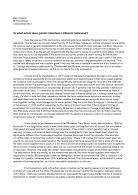A study done by Christiansen in 1977 looked at the extent of genetics through a twin study. He did this by looking specifically at criminal behaviour patterns of approximately 3,500 twins raised together. He looked at both monozygotic twins who are genetically identical and dizygotic twins who are relatively genetically similar. For monozygotic twins and dizygotic twins there was a 35% and 13% chance that both twins showed criminal behaviour, respectively. (Putwain 34). If genetics was the only variable in behaviour then there would be a 1:1 correlation for criminal tendencies in monozygotic twins. However as there is far less than that, we can conclude that external factors also influence behaviour. Looking further into this study, it’s vital to note that other causations include the twins similar same social and economic factors, that could lead them to commit crime. It is also possible that because monozygotic twins spend more time together, as they would always be the same gender, they are more likely to engage in the same types of behaviours. In 1972 another researcher by the name of Crowe found that if the biological mother of an adoptee had a criminal record, so did nearly 50 percent of adoptees by the age of eighteen (Putwain 35). This study shows that if criminal tendencies are innate then the environment can do little to alter this. Both studies by Christiansen and Crowe establish that the genetic influence is vital to an extent, however environment plays an unavoidable role.
A twin study on an immense scale is the Minnesota Twin Study, which was initiated in 1990 by Bouchard. It is a longitudinal study where twins raised apart and together from all around the world were interviewed and examined both mentally and physically. If the extent to which genetics had an impact was very minimal, and external surroundings was the leading factor then twins raised apart should be significantly different than twins raised together. However Bouchard found the opposite. One example out of the range of factors they looked at was personality. Where 1.00 implies that twins raised apart are exactly the same as twins raised together, the results were that twins raised apart had a score of 0.50 and the twins raised together had a score of 0.49. (Hock 22) As twins raised apart and together have roughly the same chance of being similar to each other, we can conclude that the extent to which genetics plays a role is very large. However, this study has certain weaknesses including the “equal environment assumption”. This assumption limits the results, as the researchers assume that twins raised together were raised in equal environments. Bouchard also looked at intelligence, where he concluded that 70% of variation in IQ comes from genetic influence, while 30% is external factors. This conclusion sums up the extent to which genetics influences behaviour, as it is an impossible explanation on its own.
It is impossible to side with either nature or nurture as the leading cause in human behaviour, as there isn’t one without the other. Progressively we are leaning towards the interaction between nature and nurture, where your genetic predispositions are expressed through environmental factors. It would be reductionist to classify human behaviour as purely a genetic feature as we are products of our everyday occurrences and situations. The talented piano player who is genetically inclined to understand music and to play fluently, cannot become a piano player without the economic capability of her parents to pay for her lessons. In the same way, someone with piano lessons cannot understand music the same way if their ears are not as programmed towards hearing and understanding tones. The studies by Christiansen Bouchard emphasize the interconnection of these factors and it is only through the examination of the cooperation of external and internal factors that we can truly gage the extent to which genetics effect our behaviour.
Works Cited
Hock, Roger R. Forty Studies That Changed Psychology: Explorations into the History of Psychological Research. Upper Saddle River, NJ: Pearson/Prentice Hall, 2009. Course Smart Solutions. Web. 4 Dec. 2012.
Putwain, David, and Aidan Sammons. Psychology and Crime. East Sussex: Routledge, 2002. www.books.google.com. Web. 4 Dec. 2012.







